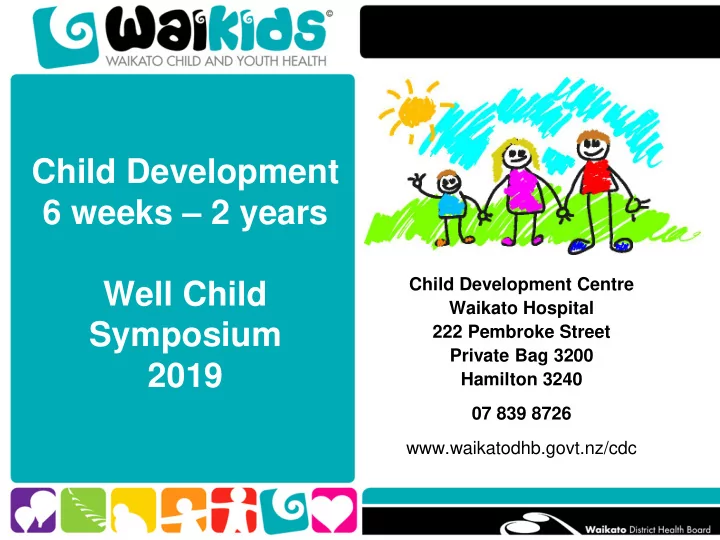

Child Development 6 weeks – 2 years Child Development Centre Well Child Waikato Hospital Symposium 222 Pembroke Street Private Bag 3200 2019 Hamilton 3240 07 839 8726 www.waikatodhb.govt.nz/cdc
What is child development? • A predictable pattern of skills developed one after the other, in a top to bottom sequence. • Reflects the growth and development of the brain and central nervous system. • Brain development starts in 4 th week of gestation and continues into the third decade of life. • A milestone is the achievement of a key performance skill.
What is normal development? • Commonly divided into 4 domains: • Gross motor • Fine motor (and vision) • Language (and hearing) • Social, emotional and behavioural
What is normal development? • The normal age at which milestones are achieved can vary widely. • The median age is when 50% of children have acquired the skill. – Most parent information discusses the median age of developmental milestones » 50% of kids walk at 12 months • The limit age is when 98% of children have acquired the skill. – Most guidelines recommend referral at the limit age of developmental milestones. » 97.5% of kids walk at 18 months.
What is normal development? – As milestones become more complex, multiple domains may be involved • Feeding self – fine motor, gross motor, social – There are a few normal variations of development • Bottom-shuffling to walking without crawling – Often familial • Initial language delay in bilingual children
Normal Development
Normal Development
Normal Development
Normal Development
Normal Development
Normal Development
Normal Development
Abnormal development • Development can be affected by genetic and environmental factors. • Positive social experiences in early childhood support brain development.
Abnormal development – Developmental delay • Milestones achieved slower than the standard population – eg. Intellectual disability – Disordered development • Abnormal pattern of milestone acquisition – eg. Autism – Developmental regression • Loss of developmental milestones/skills – eg. Rett syndrome
Abnormal development How common are developmental problems? • Global developmental delay affects 1-3% of children – up to 33,000 NZ children • Autism 1% – >11,000 NZ children • Mild learning disability 1-2% – up to 22,000 NZ children • Severe learning disability 0.3-0.5% – up to 3,300 NZ children
What do I do if I’m worried? • Parents Evaluation of Developmental Status (PEDS) – Screening tool used to identify developmental and behavioural problems in 0-8 year olds. • Screening tools do not diagnose developmental problems. They screen populations to determine who requires further investigation. – 10 questions that draw out parent concerns.
PEDS • The language is important. Please don’t change the wording on the form unless using a translator.
PEDS Form
PEDS form
Step 6-Pathways on PEDS Interpretation forms Pathway A – two or more predictive concerns High risk of developmental delay. Refer on. Pathway B - one predictive concern Repeat at next appointment. Pathway C – non-predictive concerns Low risk of developmental delay. Offer information and discuss strategies. Pathway D – parental communication difficulty Use an interpreter if appropriate. Pathway E – no concerns
Supporting Child Development
Supporting Child Development – Use your senses – Explore • Touch, listen and look at objects (e.g. • Use a variety of things for your child to sand, leaves and toys) explore and play with – bubbles, pots and pans, play doh. – Move about • Cupboards are full of exciting things • Help your child move, push and pull – Talk and problem solve objects • Puzzles – Out and about – Use imagination • Go to libraries • Read books • play out simple ideas and gradually introduce different scenarios or roles • Visit parks • play with dolls/teddies/figurines – climb, throw and kick balls • Ride a bike • creatively use boxes or containers as play objects (e.g. as a car)
What to do next? • Why refer? – Early identification and intervention improve the outcomes for children with developmental disability. • Preschool interventions are highly cost-effective. – Provides parents and caregivers with reliable information. – Early detection of a genetic diagnosis may impact on family planning.
• When to refer – Any concerns about loss of skills (regression) – Unusual pattern of skill acquisition (disordered development) – Concerns flagged on screening tool (PEDS) and corroborated by observations and kindergarten information.
Child Development Centre
Child Development Centre
• Dr Sneha Sadani • Waikato DHB • NZ Ministry of Health • Queensland Health Child and Youth Community Health Service
Questions?
Recommend
More recommend